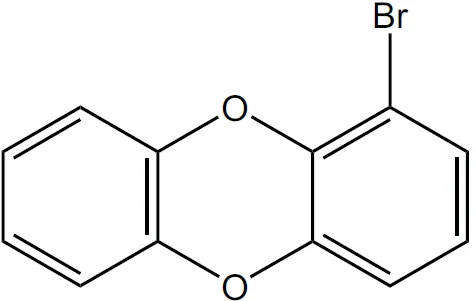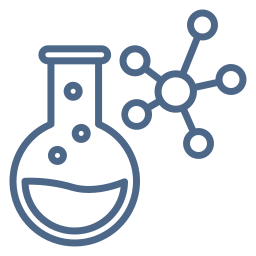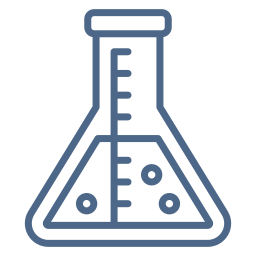BROMINATED DIBENZO-p-DIOXINS
Our range of brominated dioxin standards (PBDDs) for your environmental analyses.Our analytical standards for brominated dioxins (PBDDs) are prepared by Wellington Laboratories, the world reference for analytical standards.
They are available as individual native or mass-labelled solutions.
Home | Wellington Analytical Standards | HFRs and Related Compounds | Brominated dioxin analytical standards (PBDDs)
Our individual brominated dioxin standards
Wellington Laboratories’ PBDD solutions are designed to guarantee optimum analytical precision. They are manufactured according to rigorous protocols and accompanied by detailed certificates of analysis.
- Highly characterised standards to guarantee precision and reproducibility.
- Compatible with various analytical methods, including LC-MS/MS.
- Allows specific quantification using labelled isotopes.
All our CRMs are available in 1.2 mL in toluene, and are ISO 9001, ISO/IEC 17025, and ISO 17034 certified.
Native Brominated Dibenzo-p-Dioxins (PBDDs) individual solutions
13C-labelled PBDDs individual solutions
Native bromo/chloro Dibenzo-p-Dioxins individual solutions
13C-labelled individual solution
Our commitments
Haute précision
Ces solutions innovantes permettent une identification et une quantification fiables des composés cibles grâce à leur pureté exceptionnelle et à leur compatibilité optimale avec les protocoles analytiques.
Conçus pour répondre aux exigences rigoureuses des laboratoires, nos standards de référence offrent une performance analytique inégalée, assurant ainsi des résultats reproductibles et conformes aux standards réglementaires les plus stricts. Avec les produits Wellington, vous bénéficiez d’outils de référence pour mener des analyses environnementales de pointe.
Fiabilité certifiée
Chaque lot est accompagné d’un certificat d’analyse détaillé, attestant de la qualité et de la pureté des composés.
Livraison rapide
France et Belgique.
Do you have a question? Contact us using the contact form. We will be delighted to advise you.
SOLUTIONS INDIVIDUELLES DE DIBENZO-p-DIOXINES BROMÉES (PBDD)
Dioxines bromées
Solutions individuelles de PBDDs natifs
Conditionnement
1.2 mL x 50ug/mL, sauf BDD-1234678 25ug/mL ; et BDD-12346789 10ug/mL
Solvant
Toluène
Fabricant
Wellington Laboratories
Disponibilité & commande
Nous contacter
| Catalogue No. | Description | CAS |
|---|---|---|
| BDD-1 | 1-Bromodibenzo-p-dioxin | 105908-71-2 |
| BDD-27/28 | 2,7/2,8-Dibromodibenzo-p-dioxin mix | 39073-07-9; |
| BDD-237 | 2,3,7-Tribromodibenzo-p-dioxin | 51974-40-4 |
| BDD-1234 | 1,2,3,4-Tetrabromodibenzo-p-dioxin | 104549-41-9 |
| BDD-1378 | 1,3,7,8-Tetrabromodibenzo-p-dioxin | 109333-31-5 |
| BDD-2378 | 2,3,7,8-Tetrabromodibenzo-p-dioxin | 50585-41-6 |
| BDD-12378 | 1,2,3,7,8-Pentabromodibenzo-p-dioxin | 109333-34-8 |
| BDD-12478 | 1,2,4,7,8-Pentabromodibenzo-p-dioxin | 109333-35-9 |
| BDD-1234678 | 1,2,3,4,6,7,8-Heptabromodibenzo-p-dioxin | 110999-47-8 |
| BDD-12346789 | Octabromodibenzo-p-dioxin | 2170-45-8 |


2,3,7,8-TBBDD – Analogue bromé du 2,3,7,8-TCDD (Tétrachlorodibenzo-p-dioxine)
13C12-2,3,7,8-TBBDD
Solution individuelle de 2,3,7,8-tétrabromodibenzo-p-dioxine marquée au ¹³C₁₂, analogue isotopique du composé natif 2,3,7,8-TBBDD.
1.2 mL x 50ug/mL, toluène
Conditionnement
1.2 mL x 50ug/mL
Solvant
Toluène
Fabricant
Wellington Laboratories
Disponibilité & commande
Nous contacter
| Catalogue No. | Description |
|---|---|
| MBDD-2378 | 2,3,7,8-Tetrabromo(13C12)dibenzo-p-dioxin |

SOLUTIONS INDIVIDUELLES DE DIBENZO-p-DIOXINES BROMO/CHLORO
Dioxines bromo/chloro natives
Solutions individuelles de Dibenzo-p-dioxines bromo/chloro natives
Conditionnement
1.2 mL, concentration variable
Solvant
Toluène
Fabricant
Wellington Laboratories
Disponibilité & commande
Nous contacter
| Catalogue No. | Description | CAS |
|---|---|---|
| 7-B-23-CDD | 7-Bromo-2,3-dichlorodibenzo-p-dioxin (97%) | 97741-74-7 |
| 2-B-378-CDD | 2-Bromo-3,7,8-trichlorodibenzo-p-dioxin (95%) | 109333-33-7 |
| 2-B-1378-CDD | 2-Bromo-1,3,7,8-tetrachlorodibenzo-p-dioxin (95%) | 131167-13-0 |
| 23-B-78-CDD | 2,3-Dibromo-7,8-dichlorodibenzo-p-dioxin | 50585-40-5 |

Dioxine bromo/chloro marquée 13C
Solution individuelle de ¹³C₁₂-2,3-dibromo-7,8-dichlorodibenzo-p-dioxin
1.2 mL x 50ug/mL, toluène
Conditionnement
1.2 mL x 50ug/mL
Solvant
Toluène
Fabricant
Wellington Laboratories
Disponibilité & commande
Nous contacter
| Catalogue No. | Description |
|---|---|
| M23-B-78-CDD | 2,3-Dibromo-7,8-dichloro(13C12)dibenzo-p-dioxin |

À DÉCOUVRIR ÉGALEMENT : LES DIOXINES CHLORÉES (PCDDs)
Référence incontournable dans la surveillance des POP, les dioxines chlorées (PCDDs) sont au cœur des réglementations internationales et des méthodes d’analyse normées.
Vous travaillez sur des matrices complexes ou des profils halogénés mixtes ? Découvrez notre large sélection d’étalons analytiques de PCDDs, disponibles en solutions natives et marquées ¹³C, pour des résultats fiables et conformes aux exigences HRGC/HRMS.
Do you have a question? Contact us using the contact form. We will be delighted to advise you.

PFAS, per- polyfluoroalkyl Substances

Halogenated flame retardants, HFRs and other compounds

Polychlorinated biphenyls, PCBs

Polybrominated diphenyl ethers, PBDEs Polybrominated biphenyls, PBBs

Dioxins, Furans, PCDDs, PCDFs

Organochlorine Pesticides, OCP

Certified reference materials

Other reagents
Find out more about brominated dioxins (PBDD)
Brominated dioxins are halogenated organic chemical compounds, similar to chlorinated dioxins, but containing bromine. Bromo-chloro dioxins, also known as bromo-chloro dibenzodioxins, are halogenated organic chemical compounds containing both bromine and chlorine atoms.
They are often generated by combustion processes, particularly the incineration of waste containing brominated flame retardants.
Characteristics and Risks
- Properties: Brominated dioxins are persistent in the environment, bioaccumulative and toxic. They can travel long distances in air, water and soil.
- Sources: The main sources of brominated dioxins are products containing brominated flame retardants, such as plastics, electronic equipment and textiles.
- Risks: Exposure to brominated dioxins can have harmful effects on human and animal health, including endocrine disruption and the risk of cancer.
Regulation and Supervision
Brominated dioxins are less studied and monitored than chlorinated dioxins, but their increasing presence in the environment has led to studies to better understand their impact. The Stockholm Convention and other international regulations aim to control and reduce emissions of these pollutants.
Analysis Methods
Sensitive and selective analytical methods, such as gas chromatography-mass spectrometry (GC-MS), are used to detect and quantify brominated dioxins.
Do you need laboratory equipment and/or consumables?
Feel free to contact us at any time.
